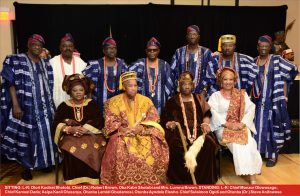
His Majesty, his wife (the Treasure of Ikorodu Kingdom), Lika (his daughter) and powerful traditional chiefs had been formally welcomed and were sitting on the high table (throne) of that day.
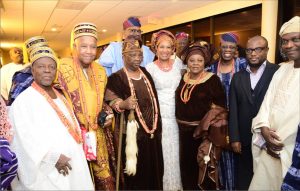 Two family members of Oba Shotobi and another from Dr. Brown’s side, led Dr. Brown to the arena; one of them played the role of Ogbeni Oja in Ikorodu, who will herald the arrival of the new chief to be installed. These three sons paid the normal respects due to the kabiyesi, by shouting his official title kabiyesioo. and prostrating before the king.
Two family members of Oba Shotobi and another from Dr. Brown’s side, led Dr. Brown to the arena; one of them played the role of Ogbeni Oja in Ikorodu, who will herald the arrival of the new chief to be installed. These three sons paid the normal respects due to the kabiyesi, by shouting his official title kabiyesioo. and prostrating before the king.
As they hailed the king and reeled out his majestic names and titles of reverence, they prostrated in deference to the monarch.

This procedure was done three times before the sons stood up near the place Dr. Robert Brown sat.. In his yellow damask and his robust stature, he was indeed a befitting candidate for chieftaincy.
 Otunba Elesho stepped in to explain what had happened. He told the audience that because of the age of the octogenarian Dr. Brown, his frail nature will not allow him to prostrate and show the due respects to a king; hence, four chiefs were mandated to perform that rite on his behalf.
Otunba Elesho stepped in to explain what had happened. He told the audience that because of the age of the octogenarian Dr. Brown, his frail nature will not allow him to prostrate and show the due respects to a king; hence, four chiefs were mandated to perform that rite on his behalf.
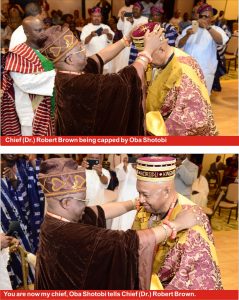 The audience was excited by the explanation and appreciated Ikorodu culture the more.
The audience was excited by the explanation and appreciated Ikorodu culture the more.
The citation of Dr. Brown was read by his longtime friend and partner, Pastor Michael Ola, who has lived in America for over forty (40) years.
As accomplished as Dr. Brown is in achievements, his profile presentation was brief and straight to the point.
One of the highlights of Brown’s citation, which is relevant to Nigeria, is that he helped his State, North Carolina, through one of his companies to generate electricity for the past twenty (20) years, a feat that will benefit Nigeria in the future.
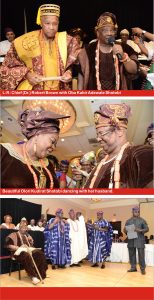 Not to be forgotten is that there was an admixture of the royal drum music that plays at occasions as this and Christian musicals. The blend was good to suit the Americans and Nigerians.
Not to be forgotten is that there was an admixture of the royal drum music that plays at occasions as this and Christian musicals. The blend was good to suit the Americans and Nigerians.
As the citation of Brown was concluded, a dignitary arrived, who was introduced as the Kabiyesi of Yorubas in South Carolina, Oba Oyotunji., who is said to have been installed by the Alaafin of Oyo. He was warmly welcomed by Oba Shotobi after the man and his entourage had paid homage to the Ikorodu monarch.
Otunba Elesho read the citation of Oba Shotobi, a lengthy piece, which traced the sojourn of the oba in the US, his years in the West African Portland Cement and his independent life as a successful oil and gas businessman before his coronation as the 19th Ayangbure of Ikorodu.
A distinct royal trumpet sound rent the air inside the hall to usher in the climax of the occasion.
Dressed in his full regalia, Oba Shotobi stepped down from the exalted platform (high table) to a lower ground. One of the noticeable difference in the rites was that there was no Ogbeni Odi, who traditionally must first sit on any seat the Oba will sit on to diffuse any danger planted by enemies on such a seat. We did not notice this because this is America.
As the monarch sat alone at the arena facing the audience, he delivered a memorable speech, recalling how he met Dr. Brown in Lagos as he lodged in the hotel he (Shotobi) worked as a staff. How he (Shotobi) served him with all respect and humility, how a father and son relationship developed out of the meeting, how Shotobi requested for help to get education in USA and how Brown obliged him.
 The monarch recounted how Dr. Brown paid all his fees, gave him a car while he was a student, monitored his progress, took care of his (Shotobis’) wife and family in Nigeria ,etc.
The monarch recounted how Dr. Brown paid all his fees, gave him a car while he was a student, monitored his progress, took care of his (Shotobis’) wife and family in Nigeria ,etc.
So, when out of his struggle back in Nigeria, God made him a king in Ikorodu, he remembered the man who educated him and lifted him, and decided to dedicate his crown to Dr. Brown. The new kabiyesi sent invitation to Dr. Brown through one Mr. Soji, but Brown could not make the trip. Instead he invited the king to North Carolina, hosted him and his entourage and promised to help Ikorodu kingdom and king Shotobi to be one of the richest in the country.
To crown it all, Oba Shotobi told the audience that Dr. Brown sent forty (40) container loads of text books for primary and secondary schools, (all expenses paid) which landed at the Ayangbure’s palace in Ikorodu a day before the king’s entourage left for this event.
He confirmed that Dr. Brown had done similar thing for another Nigerian state and even for South Africa and was willing to do more for Ikorodu people, including a unique library that is being proposed.
A man, who has helped and made many people happy, a man still willing to raise other people, Oba Shotobi decided to honour Dr. Brown in his domain, especially as he is now in his 80’s and cannot travel around the world easily as he used to do.
The Ikorodu monarch called for the paraphernalia of the chieftaincy office. They include the costumes, namely the cap, the robe, the beads, the horsetail, the hand fan, the staff of office, a walking stick, among others.
But before he commenced the rites, he asked for the people’s consent to install Dr. Robert Brown as a chief. He asked for the concept of his wife, his chiefs and all Nigerians present. In one accord, they stood up and chorused, “yes, carry go”.
Then, the kabiyesi turned to the wife of Dr. Brown, a light complexion, tall, pretty lady and asked for her consent which she readily gave. The same went to for Dr. Brown entourage.
Having been empowered, the Ikorodu monarch went to brass tacks. Starting with the cap he sought permission at every stage from his wife, and the chiefs present if he was right and permitted to install Dr. Brown as a chief in Ikorodu Kingdom. Each of those consulted touched the cap, blessed it as it was passed round. Then the Kabiyesi did the same for other vital components.
The king had earlier told Dr. Brown that Ikorodu chieftaincy is not sold but that he must perform the necessary rites including the compulsory one pound, one shilling and the money tributes to different chieftaincy titles/institutions usually put into different bowls. This money, which this writer learnt was taken home intact by the kabiyesi,will be shared among the various grades of chiefs (both the ones who traveled to the USA for the ceremony and those at home who did not).
There is joy in understanding the African culture. The provision of water, symbolizing life; kolanut, a symbol of love  and unity; alligator pepper, a symbol of power, and other items, confer wisdom of the ancient kingdom.
and unity; alligator pepper, a symbol of power, and other items, confer wisdom of the ancient kingdom.
As the chiefs touched Brown’s cap, they prayed that it would not bring or cause headache to its wearer.
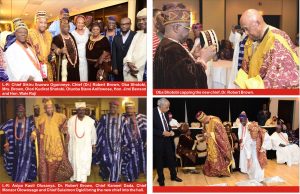 The final stage was to place the cap on Dr. Robert Brown’s head three times. Each time it was placed, it was removed by the Oba as he kept asking if this man deserves this cap or not and if he (the) Oba should install him or not. The answer in each case was “YES”.
The final stage was to place the cap on Dr. Robert Brown’s head three times. Each time it was placed, it was removed by the Oba as he kept asking if this man deserves this cap or not and if he (the) Oba should install him or not. The answer in each case was “YES”.
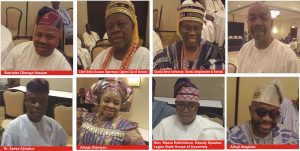 He did the same for the beads on the neck of the new chief, who was given the title “Pillar of Ikorodu Kingdom”. The bead, the nza (horse tail), the walking stick and the powerful staff of office were all presented to Brown.
He did the same for the beads on the neck of the new chief, who was given the title “Pillar of Ikorodu Kingdom”. The bead, the nza (horse tail), the walking stick and the powerful staff of office were all presented to Brown.
The kabiyesi told the new Chief Dr. Brown that apart from Aremo Adeniyi Ogunsanya, no other person in the universe has the kind of staff of office he was being given that day, a symbol of power and influence among the chiefs.
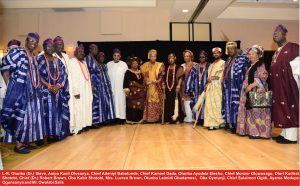 Then he blessed the new chief, made some powerful pronouncements and declarations on him and sat with Chief Brown to break the kolanut, the alligator pepper, the water and to complete the other traditional rites.
Then he blessed the new chief, made some powerful pronouncements and declarations on him and sat with Chief Brown to break the kolanut, the alligator pepper, the water and to complete the other traditional rites.
As these rites were being done, royal music and Christian music flowed from different directions. They became the climax of the earlier performance by a group called he Spirit of David and another one which mimed as in Yoruba folk tales. These were interlude performances to whet the appetite of the audience during the two hour event, which eventually ended at about 10:00 pm local time.
